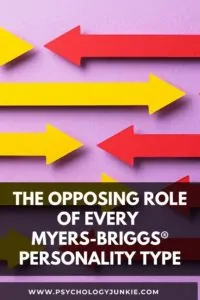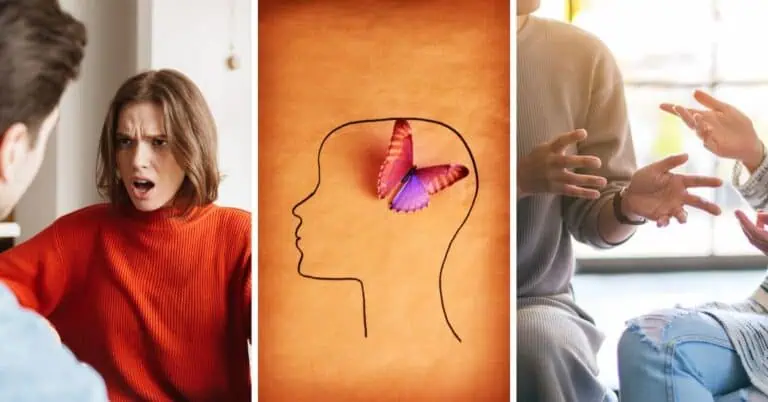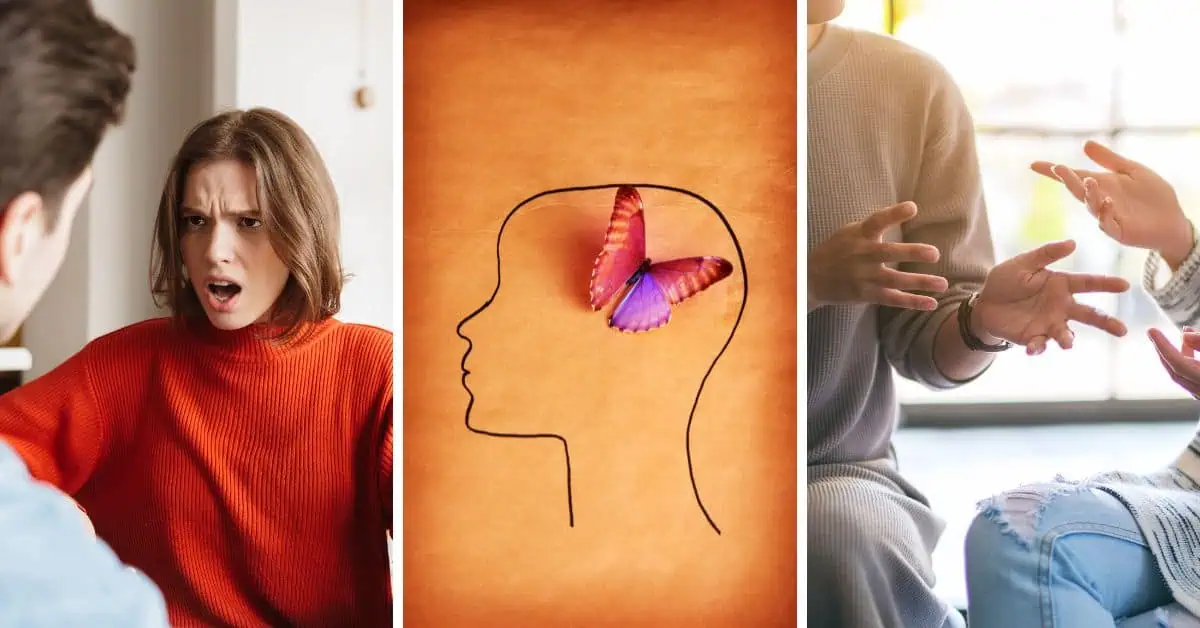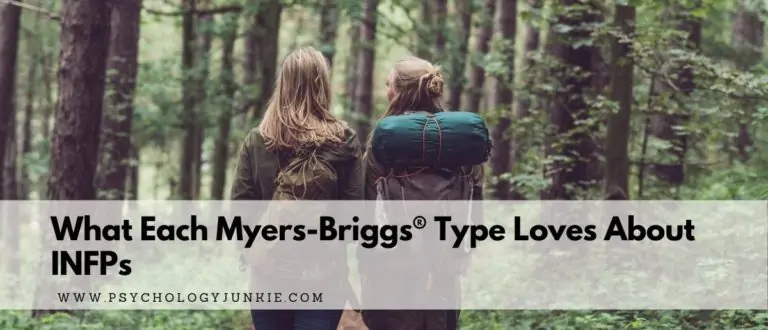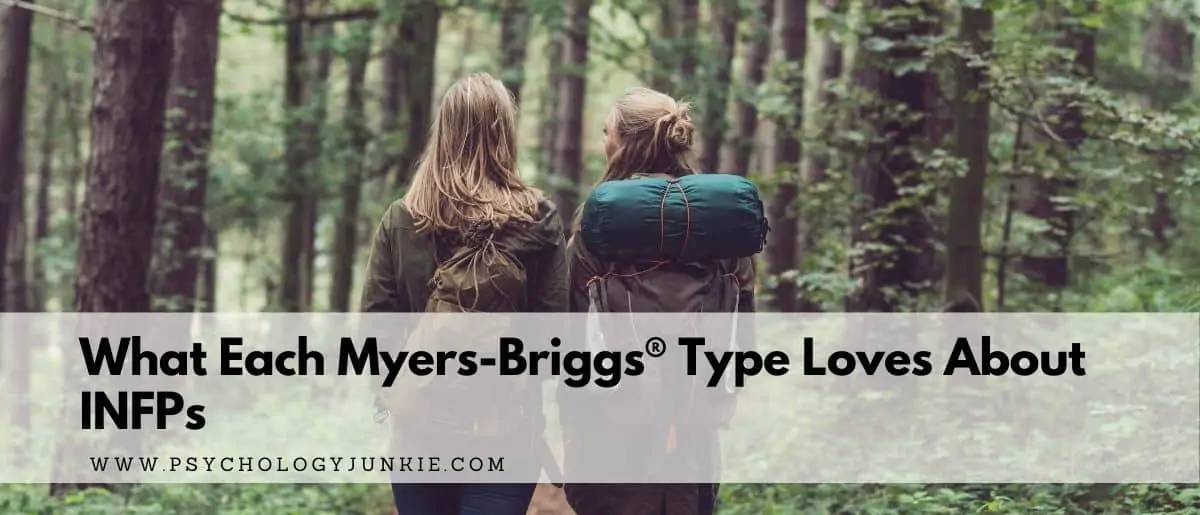The Opposing Role of Every Myers-Briggs® Personality Type
Do you really want to dig deep into your personality type and how it works? If you’re tired of worn-out, lite-quality data then you’re in the right place. We’re learning about each of the 16 Myers-Briggs® personality types in-depth by breaking down their cognitive function stacks and seeing 8 unique ways that they experience the world.
We’ve already explored the four primary functions of each personality type. You can find out more about these in the following links:
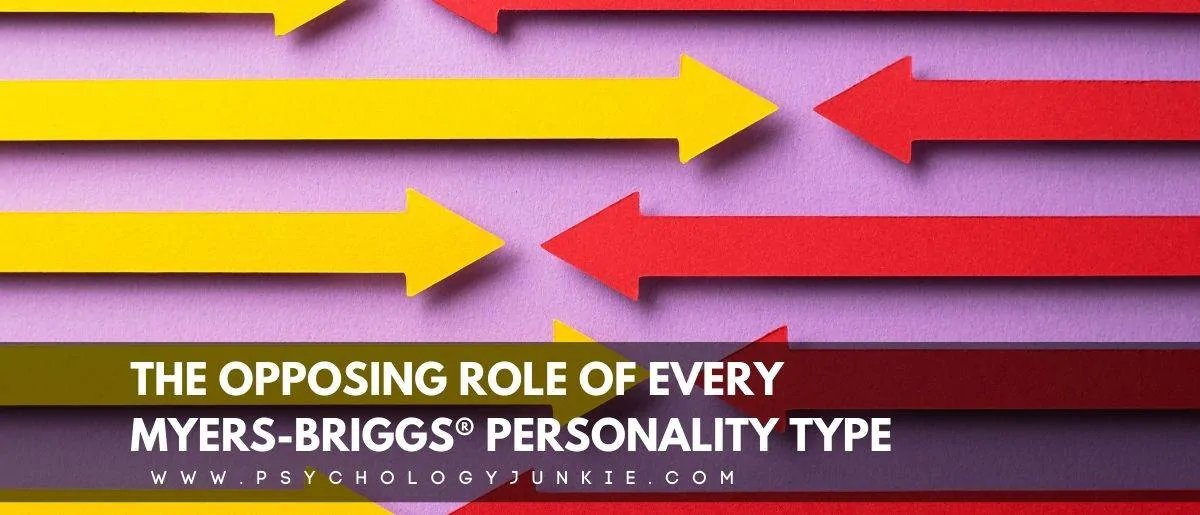
The Dominant Function of Every Myers-Briggs® Personality Type
The Auxiliary Function of Every Myers-Briggs® Personality Type
The Tertiary Function of Every Myers-Briggs® Personality Type
The Inferior Function of Every Myers-Briggs® Personality Type
What Is the Opposing Role?
The opposing role lies in the opposite direction of the dominant function of your personality type. If you’re an ENFP, for example, your dominant function is Extraverted Intuition (Ne). As a result, your Opposing Role would be Introverted Intuition (Ni). Where your dominant function is the leader of the four valued functions in your psyche, the opposing role is the leader of the unvalued/shadow functions. Mark Hunziker, author of “Depth Typology,” states that the Opposing Role “feels like “Other,” rather than part of “Me,” and its behaviors are usually uncouth or unacceptable.”
When your ego feels threatened or you feel frustrated, your Opposing Role can show up as a defender from real or imagined threats. However, unlike the dominant function, which shows up in a mature and heroic way, the Opposing Role is more oppositional, paranoid, or passive-aggressive. This function can feel dull, banal, or lifeless to us.
When you’re using your Opposing Role function you can seem one-dimensional and disinterested. You might behave like you’re completing a chore that has to be done, but you’d rather not do it – and certainly not with precision.
We also are at risk of projecting our Opposing Role onto other individuals. Because we experience the function as frustrating, distracting, and oppositional, we may perceive others using this function in the same light.
For example, an INTJ with Opposing Role Extraverted Intuition might argue with an ENFP, feeling like they are being oppositional with their alternative suggestions and insights. They may think things like, “Why is she fighting with me on my insights?” “Why isn’t she treating me with respect?” “Why is she making things so difficult?” “What’s her hidden agenda?”
You can dig deeper into the shadow functions in this article: An Introduction to the Shadow Functions
Not sure what your personality type is? Take our new personality questionnaire here. Or you can take the official MBTI® here.
The Opposing Role of Every Myers-Briggs® Personality Type
The ENFP and ENTP – Oppositional Introverted Intuition (Ni)
Introverted Intuition is focused primarily on foreseeing implications, effects, and transformations. Ni-dominant types (INJs) are gifted at predicting how things will evolve over time. They are primarily focused on the ripple-effects of everything happening around them.
As an ENP personality type, you are focused on generating multiple alternatives through Extraverted Intuition and extrapolating on those alternatives and ideas. You’re more fascinated with creating options than narrowing them down. When you’re with someone who is taking all your ideas and alternatives and sifting through them, you can feel like they are being oppositional or condescending. “Why are you throwing out that idea?! That’s a good one!” you might think. As you increasingly multiply new ideas and possibilities, and they increasingly zone in on one, you might get annoyed that they won’t just enjoy the new ideas you’re creating. As a result, you might occasionally see INJs as oppositional, patronizing, or limited in their thinking.
Simultaneously, you might also experience Introverted Intuition in a destabilizing way. You might lock onto a vision of something not working out the way you want. If you pick an idea to build your life around, you can become stubborn about how you imagine it will unfold. When people are arguing with you, you can easily sense how all their ideas and arguments could be meaningless or futile in the end.
When you find yourself being stubborn or oppositional, ask yourself, “Am I anticipating the long-term effects of something?” “Do I feel like this person is cutting out options that I want to explore?” “Am I imagining an implication that the other person doesn’t see?”
Introverted Intuition isn’t always negative. It can show up in a positive way in your life. You may easily sense how things might unfold or you might get sudden, “aha” insights about future trends and patterns. In the end, the Opposing Role serves to keep your dominant function from getting inflated. It also serves to protect your ego in stressful situations.
Read These Next:
24 Signs That You’re an ENFP, the “Visionary” Personality Type
The INFJ and INTJ – Oppositional Extraverted Intuition (Ne)
Extraverted Intuition explores connections and relationships between things that are happening in the outside world. It is also focused on extrapolating new possibilities, seeing things in new ways, and generating alternatives and multiple options. Ne-dominant types (ENPs) are gifted at brainstorming, picking up on seemingly random relationships, and innovating.
As an INJ personality type, you are focused on zero-ing in on one singular, underlying purpose or meaning behind things. You want to understand the “dance of the universe” and predict how things will play out. As a result, multiplying options, and traveling down multiple paths of possibility can seem pointless to you. You don’t want to be distracted from your singular vision. While you’re good at exploring different angles and perspectives, you want to stay the course towards your main vision. Therefore, when you’re dealing with an ENP who keeps suggesting alternative angles, different ideas, and new possibilities, you can feel like they’re being distractible, oppositional, and needlessly difficult. You might think to yourself, “Why are they changing the subject?” “Why does this other rabbit trail matter?” “Why are they opposing my vision?”
Simultaneously, you might experience Extraverted Intuition in a destabilizing way. You might, without trying, suddenly envision outlandish, bizarre possibilities in your mind. For example, if you’re driving your car you might suddenly imagine driving off a cliff with your family in the backseat. If you’re on a first date, your mind might suddenly picture numerous embarrassing things you could do. “What would happen if I coated my face with this vegetable soup?” “What would happen if I told him my worst secret?” “I could pull my shirt off right in the middle of this room and what would happen?” Although you’d never actually follow through on these ideas, they seem to play before your mind’s eye without effort.
When you find yourself being stubborn or oppositional, you might want to ask yourself, “Am I assuming they’re not seeing another side to this?” “Am I extrapolating alternatives that nobody else is seeing?” “Do I feel like someone’s steering me away from my main vision?”
Extraverted Intuition isn’t always negative for you. You can often perceive multiple interpretations of something, generate new possibilities, and see abstract connections between things. This function helps to keep your dominant function from becoming too inflated or stubborn. It can also help you to broaden your perspective.
Read These Next:
24 Signs That You’re an INFJ, the “Mystic” Personality Type
24 Signs That You’re an INTJ, the “Strategist” Personality Type
The ESTP and the ESFP – Opposing Role Introverted Sensation (Si)
Introverted Sensation reviews and recalls past experiences and applies any learned lessons to the current moment. It digs deeply into information and data and reflects on impressions that that data provides. Si-dominant types (ISJs) enjoy having a routine, a sense of stability, and repeating experiences and rituals that they’ve come to love throughout life. They crave a physically comfortable, calm life.
As an ESP personality type, you are drawn to new and novel experiences. You enjoy staying in the present moment, grasping opportunities as they arise, and being spontaneous. A planned-out, routine life can make you feel bored, irritable, and trapped. When you spend time with ISJs, you might find them to be restrictive, condescending, or oppositional. You might think to yourself, “Why are they limiting my options?” “Why are they going into so much detail about this?” “Why do they keep dredging up the past?”
Simultaneously, you might experience Introverted Sensation in a destabilizing way. You might inadvertently find yourself recalling past mistakes or traumas and assuming the same situations will repeat themselves. You might get so fixated on the nitty-gritty details of a project that you don’t make progress because you can never make every detail perfect.
When you find yourself being stubborn or oppositional, you might want to ask yourself, “Am I getting too stuck on little details?” “Am I assuming a past experience will repeat itself?” “Am I not letting go of a past mistake that I or someone else made?” “Am I making assumptions about this person based on a previous experience?”
Introverted Sensation isn’t always negative for you. You might be able to provide good historical context to a situation by recalling details or lessons from the past. You might have a knack for noticing details and discrepancies that other types don’t.
Read These Next:
24 Signs That You’re an ESTP Personality Type
What It Means to be an ESFP Personality Type
The ISFJ and the ISTJ – Opposing Role Extraverted Sensation (Se)
Extraverted Sensation is skilled at noticing everything that’s happening in the present moments. It’s attuned to opportunities, experiences, and spur-of-the-moment enjoyments. It can accurately assess what’s happening without getting lost in reflections. Se-dominant personality types (ESPs) have a knack for staying in the present, responding to surprise information or tasks, and maneuvering the physical world around them.
As an ISJ personality type, you crave a predictable, stable lifestyle. You enjoy knowing what to expect and what’s about to happen. You enjoy post-processing positive experiences because they can seem very overpowering in the present. After an experience, you can immerse yourself in the reflection of that experience and enjoy the details of it more.
Because you like familiarity and consistency, you can feel like ESPs are reckless, overly-impulsive, or distractible. You may feel like they’re being needlessly oppositional, patronizing, or snarky. Instead of accepting your tried-and-true way of doing things, they offer new ways. Instead of sticking to a routine, they change things up every day. Instead of prioritizing comfort and physical well-being, they test their limits and task risks. You might wonder to yourself, “Why are they disregarding my experiences?” “Why are they chasing excitement instead of being content with where they are?” “Why are they so heedless of stability?”
Simultaneously, you might experience Extraverted Sensation in a destabilizing way. There are times that you might randomly do impulsive, physical things or become stubborn about the “facts of reality” or what’s relevant in the moment. You can focus on the present and be spontaneous, but it doesn’t feel as enjoyable or rich as re-experiencing something you know and love. It might feel strange, uncomfortable, or scary.
When you find yourself being stubborn or oppositional, you might want to ask yourself, “Am I getting caught up in the present?” “Am I being too impulsive?” “Am I too over-stimulated by what’s happening around me?” “Am I pushing myself too far physically?”
Extraverted Sensation isn’t always negative for you. You can experience it in positive ways, letting loose and enjoying a fun opportunity that is all new. You might also have detailed, accurate awareness of what’s happening around you at times. Se can help you to quickly see what’s relevant in a situation.
Read These Next:
24 Signs That You’re an ISTJ Personality Type
24 Signs That You’re an ISFJ Personality Type
The ESFJ and the ENFJ – Opposing Role Introverted Feeling (Fi)
Introverted feeling focuses on alignment with one’s inner values and feelings. It asses one’s own emotional state and tries to discern what those states mean. Living in harmony with one’s ethical code , desires, and emotional needs is of the highest priority to the Introverted Feeling type (IFP).
As an EFJ personality type, you are constantly scanning the emotional wavelengths of the people around you. You quickly pick up on people’s emotional and physical needs and try to make sure those are taken care of. When you go to a new place, you probably notice without trying what the expectations and social customs are. It’s important to you to ensure the harmony of the group you are in and to create an atmosphere where people can do (and feel) their best.
Because your feeling is directed outwardly, introverted feeling can seem mysterious and confusing to you. You like to openly share your values and discuss your feelings, while IFPs are more contained about theirs. You will adapt your plans and demeanor for the overall well-being of the group, whereas IFPs are more individualistic. It may feel to you like Introverted Feeling types are being needlessly oppositional, troublesome, and self-absorbed because you experience Fi in an oppositional way. You might find yourself asking things like, “Why aren’t they thinking of other people’s feelings?” “Why aren’t they telling me how they feel?” “Why aren’t they getting aligned with the group so we can achieve this goal?” It can feel like tailoring everything to one’s own individual needs will cause too much trouble for everyone else.
You might also experience Introverted Feeling in a destabilizing way. You might persistently berate yourself over your perceived ethical failings or failing to follow your own desires. You might be able to quickly perceive when people are not living up to their values and feel tempted to call them out on it. You might get annoyed at your tendency to care for others, feeling like you’re abandoning the inner emotional needs of your Introverted Feeling side.
When you find yourself being stubborn or oppositional, you might want to ask yourself, “Are my ethics being trampled on in some way?” “Am I living according to my conscience?” “Am I getting enough time for my own needs and desires?” “Am I dealing with someone who is demanding space for their individualized priorities?”
Introverted Feeling isn’t always negative for you. There will be times when you experience it in positive ways, standing up for what you believe is right and prioritizing the activities that align with your personal desires and values.
Read These Next:
24 Signs That You’re an ENFJ Personality Type
24 Signs That You’re an ESFJ Personality Type
The ESTJ and the ENTJ – Opposing Role Introverted Thinking (Ti)
Introverted Thinking categorizes and sorts information into fine-tuned inner libraries. It evaluates and analyzes data deeply, looking for key principles, underlying frameworks, and inconsistencies. Introverted Thinking personality types (TPs) value clarity and precision with words and are more focused on getting the right answer than a quick answer.
As an ETJ personality type, you value efficiency, practicality, and order. You have a knack for systematizing and creating procedures so that complex tasks can be simplified and completed quickly. You quickly notice when something is slowing things down or someone is lacking direction. You value empirical thinking and measurable facts. Because Introverted Thinking is so intensive and inward in its focus, it can feel slow and inefficient to you. Digging into technicalities and minutiae of detail about a logical principle feels like it’s distracting from your overall plans. You might feel like ITPs are being too slow to come to a decision or are making things needlessly difficult. You might feel like you want them to hurry up and move forward instead of analyzing so much. Questions might pop into your head when you’re with an ITP, like, “Why are they slowing us down?” “Why can’t they see that the answer is clear?” “Are they testing me?” “Why don’t they respect my plans?”
Introverted Thinking can also be destabilizing to you at times. You might find yourself inwardly criticizing your plans or rules, seeing minute inconsistencies or loopholes. You might also find yourself after a busy day critiquing arguments you made or getting stuck in analysis paralysis over minute details of something.
When you find yourself being stubborn or oppositional, you might want to ask yourself, “Do I feel like a logical principle is being violated?” “Do I feel like this person is taking too long to come to a decision because they’re analyzing too much?” “Am I unable to inwardly categorize what’s happening in a logical way?” “Am I getting stuck on fine-tuned accuracy over efficiency?”
Introverted Thinking isn’t always negative for you. You can tap into this function fairly well at times, but it doesn’t feel invigorating or useful to you. You’re probably very adept at seeing which logical principles are best in a given situation. You’re also probably quick to spot fine-detailed inaccuracies or logical fallacies that diminish the power of someone’s argument.
Read These Next:
10 Things You’ll Relate to if You’re an ENTJ
24 Signs That You’re an ESTJ Personality Type
The ISFP and the INFP – Opposing Role Extraverted Feeling (Fe)
Extraverted Feeling is focused primarily on connecting with and considering other people and the external environment. Extraverted Feeling types (FJs) try to get everyone on the same page so that people can move in a unified direction. They will often put their own individualized concerns on the backburner to focus on the needs of the group.
As an IFP personality type, you consider yourself empathetic and considerate, but more important than connecting outwardly is connecting inwardly. You want to live in alignment with your core desires, priorities, and values. If that makes you a misfit or disconnected from the group then so be it. When you’re dealing with FJ personality types you might feel like they are working too hard to please everyone, bending for others too much, or distracting from people’s personal values in the name of “harmony” too much. You might ask yourself things like, “Why can’t they make space for people’s individual values? We don’t all have to agree!” “Why are they undermining me?” “Do they have a hidden agenda?”
You might also experience Extraverted Feeling in a destabilizing way at times. You might find yourself inwardly bombarded by the agreed-upon group standards of the environment you are in. You might feel overwhelmed by other people’s emotions and values. You might become stubborn about how others affect you, trying to set up boundaries to protect you from their demands or needs.
When you find yourself being stubborn or oppositional, you could ask yourself these questions, “Do I feel pressured to conform to group values?” “Do I want others to conform to group values?” “Am I feeling emotionally overwhelmed by other people’s feelings?” “Am I tired of accommodating others?”
Extraverted Feeling isn’t always negative for you. You can tap into this function fairly easily at times, but it doesn’t feel as rich or reviving as Introverted Feeling. You may easily tune into other people’s needs or sense their emotional experiences. You can also quickly pick up on group expectations, but whether you choose to adhere to them depends on how they align with your inner values.
Further Reading for Understanding Your Type:
24 Signs That You’re an INFP Personality Type
24 Signs That You’re an ISFP Personality Type
The ISTP and the INTP – Opposing Role Extraverted Thinking (Te)
Extraverted Thinking organizes and structures the environment for efficiency and progress. It focuses on empirical facts to move forward and is conscious of time, deadlines, and order. Extraverted Thinking types (TJs) like to move at a methodical and rapid pace towards their goals, so they rely on rules or general guidelines to keep their pace as quickly as possible.
As an ITP, you are deeply analytical. You enjoy evaluating data and categorizing it inside your mind, creating a mental map of how things work. Rather than getting a cassette tape player and immediately using it by following the basic steps, you might feel tempted to take the whole thing apart and understand how it works, re-build it, and try it again. You like understanding how things work more than the quick steps you need to follow to use them. Because of this, you can have difficulties with TJ personality types because they are more focused on implementation than understanding. You might feel pressured by them to do less analysis than you’d like to. When you’re with them, you might find yourself thinking things like, “Why are they rushing me?” “Why are they over-simplifying this?” “Why are they opposing me?” “Why are they making things so difficult?”
You might also experience Extraverted Thinking in a destabilizing way at times. For example, you might randomly get stubborn about how things are organized and insist on a very systematic approach to how a procedure should be done. You might get annoyed at the general lack of structure and order around you but feel like it’s a waste of time to try to fix it. You might become oppositional or stubborn with people who you feel are trying to enforce their rules on you.
When you find yourself being stubborn or defiant, you might ask yourself, “Am I feeling rushed?” “Do I feel like things are being run inefficiently?” “Do I feel like someone’s trying to force me into their sequence or system?” “Am I not getting enough time to analyze the situation to my satisfaction?”
Extraverted Thinking isn’t always a negative function for you. You can tap into this side of yourself fairly easily, but it doesn’t provide the same satisfaction or interest as Introverted Thinking does. You may easily pick up on structures, rules, and empirical truths, but you tend to focus on your individual principles and precise understanding instead. You may also be very decisive when the situation calls for it, putting your analysis on the backburner to focus on efficiency because it’s situationally logical.
Further Reading for Understanding Your Type:
24 Signs That You’re an INTP Personality Type
What Are Your Thoughts?
Do you have any insights or input related to this topic? Share your thoughts with other readers in the comments!
Find out more about your personality type in our eBooks, Discovering You: Unlocking the Power of Personality Type, The INFJ – Understanding the Mystic, The INFP – Understanding the Dreamer, and The INTJ – Understanding the Strategist. You can also connect with me via Facebook, Instagram, or Twitter!



